Marcia Thornton Jones's Blog, page 141
January 11, 2017
My New(ish) #1 Task
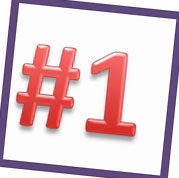
by Jody Feldman
One thing has become abundantly clear to me over the past six weeks: The most important task I have as I write my books is ...
Oops. Not gonna tell you yet.
Let me backtrack to the reason for my new conclusion. Recently and in a strange, world-converging set of circumstances, I simultaneously* turned two novels in to my agent. And while I thought I’d nailed the task of which I’m about to explain, her notes suggested I didn’t. Essentially, it’s this:
When the reader is on page 38, what will make him or her turn the page to 39? 140? 241? What gives your reader the impetus to keep reading until The End?
By now, you might be yawning and rolling your eyes and wondering why you even bothered to read this far. That’s a given, right? It’s such an obvious essential. It’s even old news to me; very, very old. It’s what my schoolgirl-self longed for every time I opened a book. Not consciously, but still.
Well, I need to be conscious now. The fact is, when you’re writing alone in your own little cave, utterly invested in the lives of your characters, everything can feel important. And while we may excel at putting ourselves in the shoes of our characters, we often forget to put ourselves in those of our audience. Starting now, that’s my #1 task.
Some will argue: No. Your #1 priority should be creating strong...
characters orplot orthemes orvoice or(chose your favorite literary quality)
But if you truly think about it, doesn’t page-turn-ability truly mean the convergence of every aspect that makes a book stand out?
Sure, the reader occasionally needs a beat to absorb what we’ve thrown at them. Even so, aren’t our readers important enough to have us take those extra steps that make the breathers and other assorted down-times just as fascinating?
That’s why I hope to craft every scene with my readers in mind. Figure out ways to make them pull out their flashlights to finish just one more chapter under their covers, way past bedtime. I owe it to them. I owe it to myself.
*To me, having two novel-length works ready within a two-month period is about as simultaneous as you can get in this business.
Published on January 11, 2017 04:00
January 9, 2017
January Theme: Forget Beginnings—Skip to the Good Parts I...
January Theme: Forget Beginnings—Skip to the Good Parts InsteadMarcia Thornton Jones
In every class I teach, writers want to know the best way to start their books. That's understandable since we’ve all heard that the opening page needs to convey tone, voice and genre, introduce character, setting, and conflict, and create page-turning tension that hooks readers (including editors and agents). It's a lot to ask of a first page or two, so I can see why so many participants in my workshops and classes want to spend time learning the best way to start their books, and I’m happy to oblige them. That being said, one thing I notice is that writers, including me, often get so focused on writing the best damn beginning we can, that we never get around to writing the rest of the story. And if we do, I’ve found that the beginning we spent so much time writing and revising and honing often doesn’t end up being the beginning at all. So, when talking about opening scenes, here’s what I think: go ahead and study first pages of successful books to determine what works (and what doesn’t), but don’t obsess about your own beginning until you are honing the final drafts. Instead, skip to the good parts of your story. Write those scenes and don’t worry too much about the opening. Then, when you feel like you’ve told your characters’ story, go back and figure out the scene that would be the best place for your readers to enter that story. But if you are at that part of your writing process, the part where you need to write the best damn beginning you can, then you just might want to check out Stephanie Orges’s May 4, 2012 “The 21 Best Tips for Writing Your Opening Scene” bekindrewrite.com blog for excellent tips:
http://bekindrewrite.com/2012/05/04/the-21-best-tips-for-writing-your-opening-scene/
In every class I teach, writers want to know the best way to start their books. That's understandable since we’ve all heard that the opening page needs to convey tone, voice and genre, introduce character, setting, and conflict, and create page-turning tension that hooks readers (including editors and agents). It's a lot to ask of a first page or two, so I can see why so many participants in my workshops and classes want to spend time learning the best way to start their books, and I’m happy to oblige them. That being said, one thing I notice is that writers, including me, often get so focused on writing the best damn beginning we can, that we never get around to writing the rest of the story. And if we do, I’ve found that the beginning we spent so much time writing and revising and honing often doesn’t end up being the beginning at all. So, when talking about opening scenes, here’s what I think: go ahead and study first pages of successful books to determine what works (and what doesn’t), but don’t obsess about your own beginning until you are honing the final drafts. Instead, skip to the good parts of your story. Write those scenes and don’t worry too much about the opening. Then, when you feel like you’ve told your characters’ story, go back and figure out the scene that would be the best place for your readers to enter that story. But if you are at that part of your writing process, the part where you need to write the best damn beginning you can, then you just might want to check out Stephanie Orges’s May 4, 2012 “The 21 Best Tips for Writing Your Opening Scene” bekindrewrite.com blog for excellent tips:
http://bekindrewrite.com/2012/05/04/the-21-best-tips-for-writing-your-opening-scene/
Published on January 09, 2017 16:24
January 8, 2017
January -- New Beginnings by Jane Kelley
A new year! Thank goodness! I can make a fresh start on a project that has bedeviled me since 2013. I'm confident that I can solve its problems. I have new insights into the material. I've learned some lessons. (Many thanks to Cheryl B. Klein's book, The Magic Words.)
But the work that I did before is absolutely crucial to any future success.
Just like this......
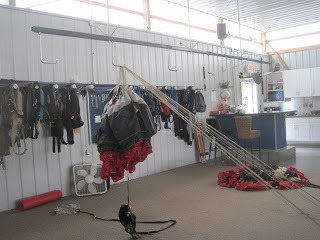
It may not look like much. A wad of fabric. Not very beautiful. Shapeless. Seemingly purposeless.
A tangle of cord.
But wait......
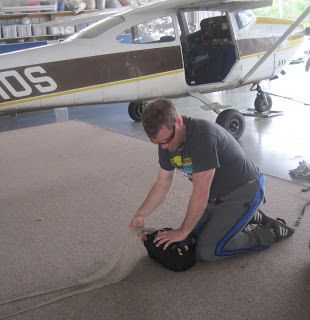
After carefully straightening out the cords and precisely folding up that fabric, all is ready for you to board that small plane and hitch a ride up higher and higher.
And then, confident that you did your preparation work well. That your idea is big enough and strong enough. That you are in fact brave enough to take that leap .....
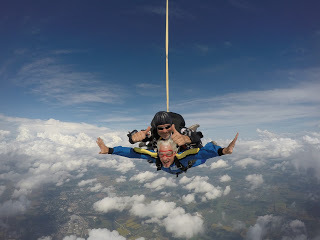
You will not fall! You will soar, as my husband did that day.
While I watched with feet safely on the ground, saving my courage to jump a different way another day.
But the work that I did before is absolutely crucial to any future success.
Just like this......

It may not look like much. A wad of fabric. Not very beautiful. Shapeless. Seemingly purposeless.
A tangle of cord.
But wait......

After carefully straightening out the cords and precisely folding up that fabric, all is ready for you to board that small plane and hitch a ride up higher and higher.
And then, confident that you did your preparation work well. That your idea is big enough and strong enough. That you are in fact brave enough to take that leap .....

You will not fall! You will soar, as my husband did that day.
While I watched with feet safely on the ground, saving my courage to jump a different way another day.
Published on January 08, 2017 03:00
January 6, 2017
Blurring the Boundaries: Writing Fiction for Boys and Girls (Yona Zeldis McDonough)
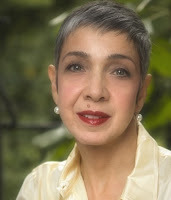 I am girly-girl writer. There, I’ve just come out and said it. Although I’ve written bios for kids that appeal to both boys and girls—many of them in the popular WHO WAS series—my real love is girl-friendly stories and the fact that no fewer than five of my children’s books have have the words dollor doll house in the title reaffirms that contention. I never saw this as a particular problem or even issue to be addressed. Subsets in the children’s audience abound, as the fans of mystery, dystopia, humor and fantasy can happily attest. So writing books that appealed chiefly to girls didn’t seem like an issue to me. But a chance meeting with an editor from Boys’ Life was the first chip in my frilly, feminine facade. We had been invited to speak on a panel together and when it was over, she encouraged me, strongly, to consider writing fiction for the magazine. I was flattered but didn’t think I was up to the task. Writing for a specifically boys market was alien to my sensibilities and I wasn’t confident I could do it. But an invitation from an editor is nothing to sneeze at and I began to play around with some ideas, eventually settling on a story set in 1941 that was slated for the December, 2016 issue. That was the 75th anniversary of the Japanese invasion of Pearl Harbor and in my story, a 12 year old boy finds himself defending his best friend, Kenzo, whose Japanese family had arrived in the United States some ten years prior and who owned the fish store in town. It was about the need for facing down prejudice and bigotry and it advanced a message of tolerance and acceptance. The editor liked the story and asked for others, which I happily provided.
I am girly-girl writer. There, I’ve just come out and said it. Although I’ve written bios for kids that appeal to both boys and girls—many of them in the popular WHO WAS series—my real love is girl-friendly stories and the fact that no fewer than five of my children’s books have have the words dollor doll house in the title reaffirms that contention. I never saw this as a particular problem or even issue to be addressed. Subsets in the children’s audience abound, as the fans of mystery, dystopia, humor and fantasy can happily attest. So writing books that appealed chiefly to girls didn’t seem like an issue to me. But a chance meeting with an editor from Boys’ Life was the first chip in my frilly, feminine facade. We had been invited to speak on a panel together and when it was over, she encouraged me, strongly, to consider writing fiction for the magazine. I was flattered but didn’t think I was up to the task. Writing for a specifically boys market was alien to my sensibilities and I wasn’t confident I could do it. But an invitation from an editor is nothing to sneeze at and I began to play around with some ideas, eventually settling on a story set in 1941 that was slated for the December, 2016 issue. That was the 75th anniversary of the Japanese invasion of Pearl Harbor and in my story, a 12 year old boy finds himself defending his best friend, Kenzo, whose Japanese family had arrived in the United States some ten years prior and who owned the fish store in town. It was about the need for facing down prejudice and bigotry and it advanced a message of tolerance and acceptance. The editor liked the story and asked for others, which I happily provided. 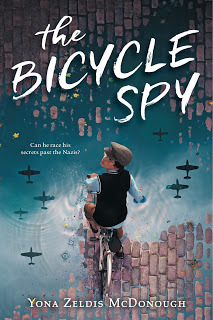 So when I was tapped by an editor from Scholastic to write what eventually became The Bicycle Spy, I had already taken some tentative steps across the gender line. Scholastic wanted a book about a 13 year old boy who lives in the Southwest of France during World War II. His parents own the bakery in town, and unbeknownst to him, are members of the French Resistance—he’s been delivering their messages that have been baked into loaves of bread. He’s an avid cyclist and fan of the Tour de France—suspended during the war years—and bicycling was to play a major role in the story, which was also to involve helping the family of a new friend to escape. These were the bare bones—the rest was up to me. I now had the task of writing a book whose primary audience would be boys, a much more challenging and complex task than writing a 1200 word magazine story. If I was going to succeed, I needed to widen and expand my range as a writer and I was nervous. Yes, I had written boy protagonists, but always in the short run. Could I sustain a boy’s point of view and hope to engage boy readers for a whole chapter book? I would soon find out. To my surprise, I found the task less daunting and more exciting than I expected. I wanted to make my protagonist Marcel appealing and relatable, so I turned him into an unlikely hero: small for his age, bespectacled and sometimes the target of the class bully’s teasing and aggression. Marcel loses to his best friend in a game of chess, flubs the occasional answer in class and dreams constantly of being stronger, taller and faster—like the winners of the bicycle race he reveres. And yet, for all his flaws, he’s also shown to be brave, loyal and determined. As Marcel’s story evolved in my mind, I realized I wanted it to include a female component, something that would appeal to girls as well as boys. And so I began to develop the character of Delphine Gillette, the new girl at school who loves cycling as much as he does and is revealed, midway through, to be Jewish. Her family has escaped from Paris and is hiding out in this small town, protected by the false papers her father has been able to procure. But when the Nazi presence intensifies, Marcel learns that the papers of the residents, particularly those newly arrived, are going to be scrutinized carefully. Delphine and her family are no longer safe. They will need to escape again and it is Marcel who is instrumental in the daring plot to help them towards freedom. As I wrote, I tried to keep the concerns of both boys and girls in mind. I knew that boys would enjoy the suspense aspects of the story, the coded messages, and the workings of the Resistance movement, as well as the descriptions of both the occupying soldiers and the French gendarmes who supported them. I also made sure to include details about Marcel’s relationship to his parents—his mother’s worry and occasional tendency to nag, his father’s pride in his courage—as well as the ones with his friends. For the girl readers, I explored Delphine’s experiences as the new girl in town, her efforts to fit in and be liked as well as her spunk and her courage. I also included references to the clothes she wore—because yes, girls do care—and her affection for her pet cat. But I also began to notice a certain blurring of gender lines and realized that ultimately the concerns of these two characters were more alike than different. They both loved cycling, worried about their place in the social pecking order, and had to deal with parental expectations. Both faced the awful upheavals of war and fear of the future. I had started out thinking that boys would relate to Marcel, and girls to Delphine; I came to see that each of these characters would have appeal for the other gender. It’s a revelation that I hope to carry with me when I approach my as-yet-unwritten next book. Writing for boys taught me something about writing for girls and I am glad to have discovered that that universe of fiction is far broader and more inclusive than I had formerly imagined.
So when I was tapped by an editor from Scholastic to write what eventually became The Bicycle Spy, I had already taken some tentative steps across the gender line. Scholastic wanted a book about a 13 year old boy who lives in the Southwest of France during World War II. His parents own the bakery in town, and unbeknownst to him, are members of the French Resistance—he’s been delivering their messages that have been baked into loaves of bread. He’s an avid cyclist and fan of the Tour de France—suspended during the war years—and bicycling was to play a major role in the story, which was also to involve helping the family of a new friend to escape. These were the bare bones—the rest was up to me. I now had the task of writing a book whose primary audience would be boys, a much more challenging and complex task than writing a 1200 word magazine story. If I was going to succeed, I needed to widen and expand my range as a writer and I was nervous. Yes, I had written boy protagonists, but always in the short run. Could I sustain a boy’s point of view and hope to engage boy readers for a whole chapter book? I would soon find out. To my surprise, I found the task less daunting and more exciting than I expected. I wanted to make my protagonist Marcel appealing and relatable, so I turned him into an unlikely hero: small for his age, bespectacled and sometimes the target of the class bully’s teasing and aggression. Marcel loses to his best friend in a game of chess, flubs the occasional answer in class and dreams constantly of being stronger, taller and faster—like the winners of the bicycle race he reveres. And yet, for all his flaws, he’s also shown to be brave, loyal and determined. As Marcel’s story evolved in my mind, I realized I wanted it to include a female component, something that would appeal to girls as well as boys. And so I began to develop the character of Delphine Gillette, the new girl at school who loves cycling as much as he does and is revealed, midway through, to be Jewish. Her family has escaped from Paris and is hiding out in this small town, protected by the false papers her father has been able to procure. But when the Nazi presence intensifies, Marcel learns that the papers of the residents, particularly those newly arrived, are going to be scrutinized carefully. Delphine and her family are no longer safe. They will need to escape again and it is Marcel who is instrumental in the daring plot to help them towards freedom. As I wrote, I tried to keep the concerns of both boys and girls in mind. I knew that boys would enjoy the suspense aspects of the story, the coded messages, and the workings of the Resistance movement, as well as the descriptions of both the occupying soldiers and the French gendarmes who supported them. I also made sure to include details about Marcel’s relationship to his parents—his mother’s worry and occasional tendency to nag, his father’s pride in his courage—as well as the ones with his friends. For the girl readers, I explored Delphine’s experiences as the new girl in town, her efforts to fit in and be liked as well as her spunk and her courage. I also included references to the clothes she wore—because yes, girls do care—and her affection for her pet cat. But I also began to notice a certain blurring of gender lines and realized that ultimately the concerns of these two characters were more alike than different. They both loved cycling, worried about their place in the social pecking order, and had to deal with parental expectations. Both faced the awful upheavals of war and fear of the future. I had started out thinking that boys would relate to Marcel, and girls to Delphine; I came to see that each of these characters would have appeal for the other gender. It’s a revelation that I hope to carry with me when I approach my as-yet-unwritten next book. Writing for boys taught me something about writing for girls and I am glad to have discovered that that universe of fiction is far broader and more inclusive than I had formerly imagined. GIVEAWAY:Yona is giving away one signed copy of THE BICYCLE SPY and one free Skype visit! Just fill out the form below to enter. If the form's not working for you, just leave a comment here--be sure to indicate whether you'd like a copy of the book or a visit!
Also, be sure to visit Yona online at her author site.
a Rafflecopter giveaway
Published on January 06, 2017 05:00
January 5, 2017
Beginning the Query by Deborah Lytton: January Theme
Happy New Year! I love beginning a new year because anything is possible. This year, I am hoping you sell your manuscript to the editor of your dreams. If you don't have an agent, you will have to write a stand out query to either an agent or an editor. When I first met my incredible agent, Stacey Glick, it was through a query letter. The letter piqued her interest and eleven and a half years later, we are still a team.
I began my query by quoting the opening of my manuscript. The first sentence you write in your book is the most important one, and you have probably spent a lot of time making it perfect, so why not use it? Your voice is in those words of fiction, and it is as unique as you are. In my query, I used the first three sentences of my manuscript because they fit together to establish the main character and her point of view. After that, I introduced the character briefly and gave a one paragraph synopsis of the plot. My third paragraph shared a little bit about me. Then I closed by letting the agent know I would be happy to send the manuscript if she would like to read more. It was a one page letter which was concise but jam-packed with personality because I used the fiction to sell itself. Do you have any tips for writing good query letters? What works for you?
Happy Writing!
I began my query by quoting the opening of my manuscript. The first sentence you write in your book is the most important one, and you have probably spent a lot of time making it perfect, so why not use it? Your voice is in those words of fiction, and it is as unique as you are. In my query, I used the first three sentences of my manuscript because they fit together to establish the main character and her point of view. After that, I introduced the character briefly and gave a one paragraph synopsis of the plot. My third paragraph shared a little bit about me. Then I closed by letting the agent know I would be happy to send the manuscript if she would like to read more. It was a one page letter which was concise but jam-packed with personality because I used the fiction to sell itself. Do you have any tips for writing good query letters? What works for you?
Happy Writing!
Published on January 05, 2017 23:14
January 3, 2017
One Hope for Writers
I keep a journal.
Some months I write in it every day. Other times, several months pass without a single entry.
I fill the pages with things that inspire me, things I want to think about, new ideas, possibilities, etc.
Mostly, it's a place for hope.
One entry includes some words (source uncited) I'd like to share with every person in the world:
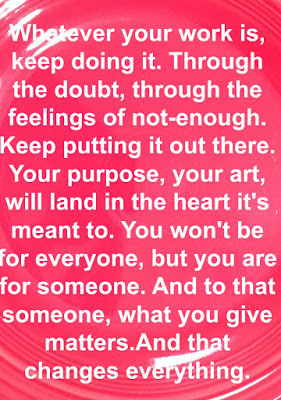
Whatever your work is, keep doing it. Through the doubt, through the feelings of not-enough. Keep putting it out there. Your purpose, your art, will land in the heart it's meant to. You won't be for everyone, but you are for someone. And to that someone, what you give matters.And that changes everything.
Happy 2017!
-------------
Irene Latham's first bits of writing were love poems – for her mother. An award winning author of two novels for children LEAVING GEE'S BEND and DON'T FEED THE BOY, she was named the winner of the 2016 International Literary Association-Lee Bennett Hopkins Promising Poet Award. Her poetry titles for children include DEAR WANDERING WILDEBEEST, FRESH DELICIOUS, and WHEN THE SUN SHINES ON ANTARCTICA. www.irenelatham.com
Some months I write in it every day. Other times, several months pass without a single entry.
I fill the pages with things that inspire me, things I want to think about, new ideas, possibilities, etc.
Mostly, it's a place for hope.
One entry includes some words (source uncited) I'd like to share with every person in the world:

Whatever your work is, keep doing it. Through the doubt, through the feelings of not-enough. Keep putting it out there. Your purpose, your art, will land in the heart it's meant to. You won't be for everyone, but you are for someone. And to that someone, what you give matters.And that changes everything.
Happy 2017!
-------------
Irene Latham's first bits of writing were love poems – for her mother. An award winning author of two novels for children LEAVING GEE'S BEND and DON'T FEED THE BOY, she was named the winner of the 2016 International Literary Association-Lee Bennett Hopkins Promising Poet Award. Her poetry titles for children include DEAR WANDERING WILDEBEEST, FRESH DELICIOUS, and WHEN THE SUN SHINES ON ANTARCTICA. www.irenelatham.com
Published on January 03, 2017 03:30
January 2, 2017
Breathe and Begin by Ann Haywood Leal
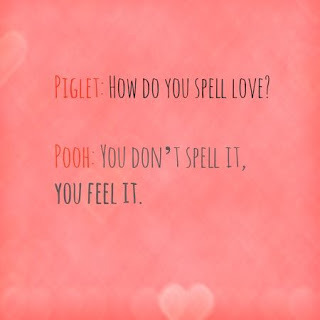 January. A new beginning. I am holding onto that feeling of hope that my writerly and book loving friends are putting out into the world. Because we all need that right now, don't we? We all need to feel as if we are okay--that we are going to be okay. We need to feel as if the world is round again, and we will not drop off a sharp curb into a scary abyss. We need to drag ourselves up and over that ledge and band together with the extra sticky glue made of kindness and inclusiveness. Because that's what a middle-grade novel is about, isn't it? Hope. Kindness. Empathy.
January. A new beginning. I am holding onto that feeling of hope that my writerly and book loving friends are putting out into the world. Because we all need that right now, don't we? We all need to feel as if we are okay--that we are going to be okay. We need to feel as if the world is round again, and we will not drop off a sharp curb into a scary abyss. We need to drag ourselves up and over that ledge and band together with the extra sticky glue made of kindness and inclusiveness. Because that's what a middle-grade novel is about, isn't it? Hope. Kindness. Empathy.So I'm offering up some of my favorite beginnings to begin 2017.
"Hold fast to dreams
For if dreams die
Life is a broken-winged bird
That cannot fly . . . "
--Langston Hughes (Okay, I cheated with this first one. Langston Hughes didn't write middle grade novels, but he was, Langston Hughes, so I get to.)
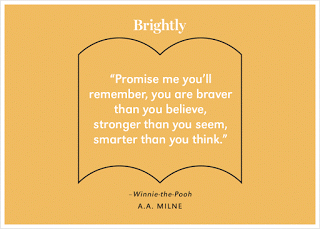 "Claudia knew that she could never pull off the old-fashioned kind of running away. That is, running away in the heat of anger with a knapsack on her back. She didn't like discomfort, even picnics were untidy and inconvenient: all those insects and the sun melting the icing on the cupcakes. Therefore, she decided that her leaving home would not be just running from somewhere but would be running to somewhere . . . "
"Claudia knew that she could never pull off the old-fashioned kind of running away. That is, running away in the heat of anger with a knapsack on her back. She didn't like discomfort, even picnics were untidy and inconvenient: all those insects and the sun melting the icing on the cupcakes. Therefore, she decided that her leaving home would not be just running from somewhere but would be running to somewhere . . . " --E. L. Konigsburg (From the Mixed-up Files of Mrs. Basil E. Frankweiler)
"We moved on the Tuesday before Labor Day. I knew what the weather was like the second I got up. I knew because I caught my mother sniffing under her arms. She always does that when it's hot and humid, to make sure her deodorant's working. I don't use deodorant yet. I don't think people start to smell bad until they're at least twelve. So I've still got a few months to go."
--Judy Blume (Are You There God? It's Me, Margaret.)
"Finally, I am twelve.
Old enough to wear a toob.
As soon as I wake, Muma whispers a birthday wish.
Blessings for all the years to come, Amira.
--Andrea Davis Pinkney (The Red Pencil)
"Lily Mollahan's bedroom was at the top of the stairs, the only one on the second floor. The top of the house, Gram always told her, the top of the world.
Lily sank back on her heels to look around at the blue walls and ceiling, and the gold stars pasted on here and there. Then she stretched up again, working with Poppy's paint scraper, to peel off a star that was almost beyond her reach."
--Patricia Reilly Giff (Lily's Crossing)
"Today is Tet,
the first day
of the lunar calendar.
Every Tet
we eat sugary lotus seeds
 and glutinous rice cakes.
and glutinous rice cakes.We wear all new clothes
even underneath.
Mother warns
how we act today
foretells the whole year.
Everyone must smile
no matter how we feel.
No one can sweep,
for why sweep away hope?
No one can splash water,
for why splash away joy?"
--Thanhha Lai (Inside Out & Back Again)
I had to stop myself, because there are so many beautiful beginnings out there. Go grab your own memorable beginning. Open a middle grade novel, or let the words of Langston wash over you with drizzles of hope.
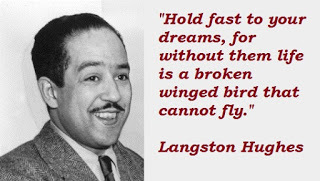
Published on January 02, 2017 07:26
December 23, 2016
When You Don't Know What to Say: Smack Dab in the Classroom by Dia Calhoun
What do you say to kids when there is so much trouble in the world, and at home? What books do you hand them to read that might speak to this? I think of the traditional hero stories where one individual can change the world by fighting the darkness. The character Will in Susan Cooper's The Darkness Rising. Frodo in The Lord of the Rings.. But most of all right now, I think of Ged, in The Wizard of Earthsea.
Through an act of great hubris, Ged released a shadow into the world. To catch and put the shadow back Ged worked to discover the shadow's name.Naming a thing gives one power over it. But Ged couldn't find the name. Only when he realized the shadow was his own, could he name it: Ged. And integrate it back into himself.
We all tend to project our own shadows--the dark, repressed, unacceptable parts of ourselves, thoughts or emotions--onto others. And are blind to it in ourselves. Countries and cultures and religions have shadows, too. They project these onto cultures or people who are different. They become "the evil," or the cause of all the bad things happening.
In my opinion, in our recent presidential election in the United States, er have just choose to be led by the collective shadow of our country.
So what do we say to kids when there is so much trouble in the world and at home? Let's start by looking closely at our own shadows so we can own them and name them. Then we'll be less likely to project them onto other people or groups. This examination is a heroic act. One individual can change the world if she begins by fighting the darkness in herself.
And be sure to hand the kids, The Wizard of Earthsea.
Wishing you joy,
Dia
Through an act of great hubris, Ged released a shadow into the world. To catch and put the shadow back Ged worked to discover the shadow's name.Naming a thing gives one power over it. But Ged couldn't find the name. Only when he realized the shadow was his own, could he name it: Ged. And integrate it back into himself.
We all tend to project our own shadows--the dark, repressed, unacceptable parts of ourselves, thoughts or emotions--onto others. And are blind to it in ourselves. Countries and cultures and religions have shadows, too. They project these onto cultures or people who are different. They become "the evil," or the cause of all the bad things happening.
In my opinion, in our recent presidential election in the United States, er have just choose to be led by the collective shadow of our country.
So what do we say to kids when there is so much trouble in the world and at home? Let's start by looking closely at our own shadows so we can own them and name them. Then we'll be less likely to project them onto other people or groups. This examination is a heroic act. One individual can change the world if she begins by fighting the darkness in herself.
And be sure to hand the kids, The Wizard of Earthsea.
Wishing you joy,
Dia
Published on December 23, 2016 12:21
December 22, 2016
Dear Me by Laurie Calkhoven
Dear Me,
Netflix is a bad thing. It is a very bad thing. You will subscribe so that you can watch the (ultimately disappointing) Gilmore Girls reunion movies, and then you will get sucked in. From four seasons of Orange is the New Black (OMG! Poussey) to Crown and House of Cards, you will get sucked in.
I know you love good storytelling and interesting characters, but binge watching Call the Midwife is too easy! One episode isn’t even over yet before the next one pops up on the bottom of your screen—beckoning. And when you sit down for lunch and promise yourself that you’ll stop at one episode of Stranger Things and then get back to work, you will be lying to yourself. You’ll watch all eight episodes.
You have research to do. You have books to write. Netflix is not good for you. It’s bad. Very, very bad.
So, for yourself, for your work, for your peace-of-mind, cancel that Netflix subscription. But first – maybe – let’s find out what happens in season five of OITNB and season two of Stranger Things.
Netflix is a bad thing. It is a very bad thing. You will subscribe so that you can watch the (ultimately disappointing) Gilmore Girls reunion movies, and then you will get sucked in. From four seasons of Orange is the New Black (OMG! Poussey) to Crown and House of Cards, you will get sucked in.
I know you love good storytelling and interesting characters, but binge watching Call the Midwife is too easy! One episode isn’t even over yet before the next one pops up on the bottom of your screen—beckoning. And when you sit down for lunch and promise yourself that you’ll stop at one episode of Stranger Things and then get back to work, you will be lying to yourself. You’ll watch all eight episodes.
You have research to do. You have books to write. Netflix is not good for you. It’s bad. Very, very bad.
So, for yourself, for your work, for your peace-of-mind, cancel that Netflix subscription. But first – maybe – let’s find out what happens in season five of OITNB and season two of Stranger Things.
Published on December 22, 2016 01:00
December 18, 2016
Dear Younger Self by Claudia Mills
Halfway through my career I wrote a middle-grade novel that I so much wanted to share with my younger self that I actually dedicated it to her. The book was Lizzie at Last, starring a bookish, poetry-scribbling girl who doesn't fit in well with her peers, suspecting that she would have fit in much better with, say, Emily Dickinson. The dedication read, "For the girl I used to be" (the title of a poem Lizzie writes to herself in the story).
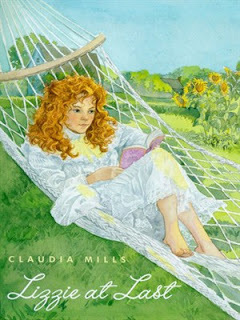 Here's what I wanted to tell to my younger self, via this book:
Here's what I wanted to tell to my younger self, via this book:
"It's going to be okay."
Just that.
"It's going to be okay."
Because it did turn out okay (well, give and take all the hideousness and hardship and heartbreak that is part of the human condition). I grew up and joined a community of fellow bookish scribblers (you know who you are!), and wrote and published a bunch of books, and found love and friendship and companionship along the way.
As each new year dawns, I always worry about what it might contain - what kinds of challenges, what kinds of loss. Some years have been delights, others have been doozies. But you know what? They all turned out okay, more or less, every one of them.
That's why I write for children, to tell all of them what I tried to tell my younger self in Lizzie at Last. Oh, my darlings, it can feel so hard, so hard, so impossibly hard. But you are not alone so long as someone in a book somewhere understands and shares your experience.
And it's going to be okay.
 Here's what I wanted to tell to my younger self, via this book:
Here's what I wanted to tell to my younger self, via this book:"It's going to be okay."
Just that.
"It's going to be okay."
Because it did turn out okay (well, give and take all the hideousness and hardship and heartbreak that is part of the human condition). I grew up and joined a community of fellow bookish scribblers (you know who you are!), and wrote and published a bunch of books, and found love and friendship and companionship along the way.
As each new year dawns, I always worry about what it might contain - what kinds of challenges, what kinds of loss. Some years have been delights, others have been doozies. But you know what? They all turned out okay, more or less, every one of them.
That's why I write for children, to tell all of them what I tried to tell my younger self in Lizzie at Last. Oh, my darlings, it can feel so hard, so hard, so impossibly hard. But you are not alone so long as someone in a book somewhere understands and shares your experience.
And it's going to be okay.
Published on December 18, 2016 03:22



